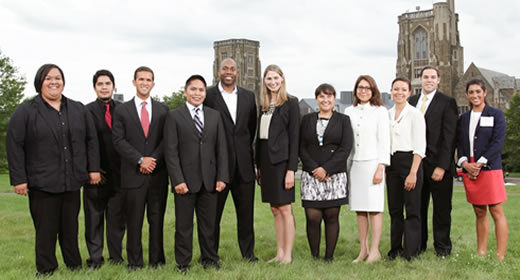
The Ford School is delighted to announce that the University of Michigan will host the tenth “Graduate Horizons” higher-education preparation program for American Indian, Alaskan Native, and Native Hawaiian students preparing to apply to graduate school. The program will run from July 9-12, 2016 with workshops at Joan and Sanford Weill Hall and at the Rackham Building.
Run by College Horizons, a non-profit organization that supports higher education among Native American students, the Graduate Horizons program brings 100 prospective graduate students (historically from more than four-dozen tribal nations across the 50 states) together for an intensive, four-day introduction to the graduate school application and admissions process.
Addressing the Access Gap
Ford School student Michon Johnson (MPP/MSW ’16), who attended the 2012 Graduate Horizons workshop at Harvard University, says the program provides extra support and encouragement for students who urgently need it. “Coming from a first-generation, low-income background, I didn’t know where to start,” says Johnson. “Graduate Horizons exposed me to a lot of successful Native people I could look up to and learn from; it raised my expectations.”
The plaque to the right of Michon Johnson (MPP/MSW '16) commemorates the Native American Land Gift to the University of Michigan in 1817.It also helped Johnson improve her graduate school application materials. Graduate Horizons participants are required to submit all the materials they would need for an actual graduate school application—their transcripts, essays, letters of recommendation, and practice GRE scores. They work with faculty and staff mentors in their field of interest (business, law, public policy, engineering, the social sciences, and more) to review and improve those materials throughout the four-day event.
“The goal of Graduate Horizons is to have students walk away with a pretty complete draft of their admissions materials,” says the Ford School’s associate director of student and academic services, Beth Soboleski (MPP ‘89). In 2014, Soboleski co-directed a Graduate Horizons working group for students with an interest in public policy; she is coordinating the 2016 program on behalf of the Ford School and University of Michigan.
“I think this is a really great, tangible expression of the Ford School and University of Michigan desire to bridge the access gap in graduate education for a severely underrepresented population,” says Soboleski.
Johnson concurs. “Given that many Native American students are first generation college students and come from small communities, Native American kids often don’t realize their potential; and when they get to college, they can feel alone and culture shocked,” says Johnson. “We need to bring more Native people to campus, and we need to give them the support they need to succeed.”
A Nation-Building Model
Carmen Lopez, executive director of College Horizons, says the organization is committed to bolstering the number of Native students who successfully obtain advanced degrees. But Lopez also emphasizes the program’s “Nation-Building” model.
“Our workshop participants come from a diverse spread of Native nations and often seek the tools to strengthen the sovereignty, socioeconomic health, and self-determination of their communities,” says Lopez. Over the years, she says, a number of Graduate Horizons alumni have gone on to become some of the first professors, doctors, lawyers, or professionals to come from their community.
According to College Horizons data, 600 students have participated in the Graduate Horizons program to date. Of these, 50 percent were first-generation college students, 50 percent lived on or near their native homelands, and 40 percent were professionals whose work directly served Native peoples.
University of Michigan Graduate Horizons sponsors currently include the Ford School, which is leading the planning efforts; the Office of Diversity, Equity, and Inclusion, which is lending generous financial support; and the Rackham Graduate School, School of Social Work, and Ross School of Business, which are serving on the coordinating committee. To learn more, contact Beth Soboleski, associate director of student and academic services, at [email protected] or 734-615-9877.
